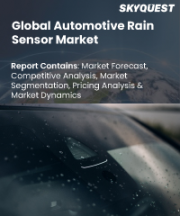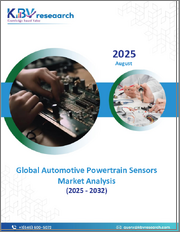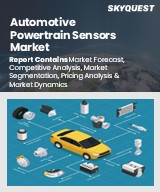
|
시장보고서
상품코드
1555641
자동차 레인센서 시장 : 산업 분석, 규모, 점유율, 성장, 동향 및 예측(2024-2031년)Automotive Rain Sensor Market: Global Industry Analysis, Size, Share, Growth, Trends, and Forecast, 2024-2031 |
||||||
Persistence Market Research는 최근 세계 자동차 레인센서 시장에 대한 광범위한 보고서를 발표했습니다. 이 보고서는 촉진요인, 동향, 기회, 과제 등 주요 시장 역학에 대한 종합적인 분석을 통해 시장 구조에 대한 심도 있는 통찰력을 제공합니다.
주요 인사이트
- 자동차 레인센서 시장 규모(2024년) : 50억 달러
- 2031년 예상 시장 규모 : 74억 달러
- 세계 시장 성장률(2024-2031년 CAGR) : 5.9%
자동차 레인센서 시장 - 조사 범위:
자동차 레인센서 시장에는 운전 보조 시스템을 강화하기 위해 최신 자동차에 탑재되는 다양한 센서 장치가 포함됩니다. 이 센서들은 앞 유리의 비와 습기를 자동으로 감지하여 와이퍼를 작동시켜 시야와 안전성을 향상시키는 역할을 합니다. 승용차 및 상용차의 스마트 차량 생태계와 첨단운전자보조시스템(ADAS)에 대한 수요 증가가 시장 성장의 원동력이 되고 있습니다. 특히 전기차 및 자율주행차 분야에서 자동차 기술이 발전함에 따라 레인센서는 고급 및 중급 차량에 기본 장착되는 추세입니다.
시장 성장 촉진요인:
세계 자동차 레인센서 시장은 몇 가지 주요 요인에 의해 성장하고 있습니다. 커넥티드카 및 지능형 자동차 생태계에 대한 수요 증가에 힘입어 전기차와 자율주행차에 레인센서를 통합하는 것이 견인차 역할을 하고 있습니다. 또한, 교통 안전에 대한 관심이 높아지고 첨단 안전 기능에 대한 규제 요건이 강화되면서 레인센서에 대한 수요가 증가하고 있습니다. 자동차 제조업체들의 운전 보조 시스템 및 편의 기능 강화 노력도 시장 성장에 기여하고 있습니다. 또한, ADAS에 대한 소비자들의 인식이 높아지고, 유럽과 동아시아 등 시장에서 전기자동차가 확대되고 있는 것도 레인센서 채택을 더욱 촉진하고 있습니다.
시장 성장 억제요인 :
자동차 레인센서 시장은 큰 성장 잠재력을 보여주고 있지만, 몇 가지 도전과제에 직면해 있습니다. 자동차에 레인센서를 탑재하는 데 드는 높은 개발 비용(특히 중저가 차량용)은 여전히 시장 성장의 걸림돌로 작용하고 있습니다. 가격 민감도가 높은 신흥 시장에서는 가격이 중요한 관심사이기 때문에 소형차 및 저가형 차량에 대한 채택이 제한될 수 있습니다. 또한, 강우량이 적은 지역에서는 레인센서가 충분히 활용되지 않는 경우가 많기 때문에 날씨와 같은 외부 요인에 의존하는 것도 수요 변동에 영향을 미칠 수 있습니다.
시장 기회 :
자동차 레인센서 시장은 특히 전기차와 자율주행차에 레인센서 탑재가 증가함에 따라 큰 성장 기회가 존재합니다. 전기자동차 증가와 ADAS의 부상과 함께 시장 확대의 새로운 길이 열리고 있습니다. 또한 북미와 유럽 등 신흥 시장에서의 SUV와 고급차 보급은 제조업체에 유리한 기회를 제공하고 있으며, 전자상거래와 소비자 직접 판매 채널의 확대는 성장을 더욱 가속화하여 제조업체가 더 넓은 고객층에 도달할 수 있도록 돕고 있습니다. 자동차 OEM과의 전략적 제휴를 통해 미래 자동차 모델에 첨단 센서 기술을 통합하는 것도 큰 성장 잠재력을 가지고 있습니다.
본 보고서에서 다룬 주요 질문들
- 자동차 레인센서 시장의 세계 성장을 가속하는 주요 요인은?
- 어떤 차량 부문이 레인센서 채택을 주도하고 있는가?
- 기술 발전은 자동차 레인센서 시장 경쟁 구도에 어떤 영향을 미치고 있는가?
- 자동차 레인센서 시장의 주요 기업은 어디이며, 경쟁력을 유지하기 위해 어떤 전략을 취하고 있는가?
- 자동차 레인센서 세계 시장에서의 새로운 트렌드와 전망은?
목차
제1장 주요 요약
제2장 시장 개요
- 시장 범위와 정의
- 시장 역학
- 성장 촉진요인
- 성장 억제요인
- 기회
- 과제
- 주요 동향
- 거시경제 요인
- 세계의 부문별 전망
- 세계의 GDP 성장 전망
- 세계의 자동차 시장 전망
- COVID-19의 영향 분석
- 예측 요인 - 관련성과 영향
제3장 부가가치 인사이트
- 차량 유형 채택 분석
- 차량 유형 평가
- 규제 상황
- 밸류체인 분석
- 원재료 공급업체 리스트
- 제조업체 리스트
- 유통업체 리스트
- 수익성 분석
- 주요 거래와 합병
- PESTLE 분석
- Porter의 Five Forces 분석
- 지정학적 긴장 : 시장에 대한 영향
제4장 가격 동향 분석, 2019년-2031년
- 주요 하이라이트
- 제품 가격에 영향을 미치는 주요 요인
- 가격 분석 : 제품별
- 지역별 가격과 차량 유형 선호
제5장 세계의 자동차 레인센서 시장 전망 : 실적(2019년-2023년)과 예측(2024년-2031년)
- 주요 하이라이트
- 시장 수량(단위) 예측
- 시장 규모(10억 달러)와 전년대비 성장률
- 절대액 기회
- 시장 규모(10억 달러) 분석과 예측
- 과거 시장 규모(10억 달러) 분석, 2019년-2023년
- 현재 시장 규모(10억 달러) 분석과 예측, 2024년-2031년
- 세계의 자동차 레인센서 시장 전망 : 차량 유형
- 서론/주요 조사 결과
- 과거 시장 규모(10억 달러) 분석, 차량 유형별, 2019년-2023년
- 현재 시장 규모(10억 달러) 예측, 차량 유형별, 2024년-2031년
- 승용차
- 소형 상용차
- 대형 상용차
- 시장의 매력 분석 : 차량 유형
- 세계의 자동차 레인센서 시장 전망 : 채널 유형
- 서론/주요 조사 결과
- 과거 시장 규모(10억 달러) 분석, 채널 유형별, 2019년-2023년
- 현재 시장 규모(10억 달러) 분석과 예측, 채널 유형별, 2024년-2031년
- OEM
- 애프터마켓
- 시장의 매력 분석 : 채널 유형
제6장 세계의 자동차 레인센서 시장 전망 : 지역
- 주요 하이라이트
- 과거 시장 규모(10억 달러) 분석, 지역별, 2019년-2023년
- 현재 시장 규모(10억 달러) 예측, 지역별, 2024년-2031년
- 북미
- 유럽
- 동아시아
- 남아시아 및 오세아니아
- 라틴아메리카
- 중동 및 아프리카
- 시장의 매력 분석 : 지역
제7장 북미 자동차 레인센서 시장 전망 : 실적(2019년-2023년)과 예측(2024년-2031년)
제8장 유럽 자동차 레인센서 시장 전망 : 실적(2019년-2023년)과 예측(2024년-2031년)
제9장 동아시아 자동차 레인센서 시장 전망 : 실적(2019년-2023년)과 예측(2024년-2031년)
제10장 남아시아·오세아니아 자동차 레인센서 시장 전망 : 실적(2019년-2023년)과 예측(2024년-2031년)
제11장 라틴아메리카 자동차 레인센서 시장 전망 : 실적(2019년-2023년)과 예측(2024년-2031년)
제12장 중동 및 아프리카 자동차 레인센서 시장 전망 : 실적(2019년-2023년)과 예측(2024년-2031년)
제13장 경쟁 구도
- 시장 점유율 분석, 2023년
- 시장 구조
- 경쟁 강도 매핑 : 시장별
- 경쟁 대시보드
- 기업 개요(상세 - 개요, 재무, 전략, 최근 동향)
- Hella KGaA Hueck &Co.
- Denso Corporation
- Pacific Industrial Co. Ltd
- Robert Bosch GmbH
- Valeo SA
- TRW Automotive
- Mitsubishi Motors Corporation
- Vishay Intertechnology
- Hamamatsu Photonics KK
- Melexis Microelectronic Systems
- The Kostal Group
제14장 부록
- 조사 방법
- 조사의 전제조건
- 두자어 및 약어
Persistence Market Research has recently published an extensive report on the global Automotive Rain Sensor Market. This report offers a comprehensive analysis of the key market dynamics, including drivers, trends, opportunities, and challenges, providing deep insights into the market structure.
Key Insights:
- Automotive Rain Sensor Market Size (2024E): USD 5.0 Bn
- Projected Market Value (2031F): USD 7.4 Bn
- Global Market Growth Rate (CAGR 2024 to 2031): 5.9%
Automotive Rain Sensor Market - Report Scope:
The Automotive Rain Sensor Market involves a wide range of sensor devices integrated into modern vehicles to enhance driver assistance systems. These sensors automatically detect rain or moisture on the windshield and activate the wipers, improving visibility and safety. The rising demand for smart vehicle ecosystems and advanced driver assistance systems (ADAS) across passenger and commercial vehicles drives market growth. Rain sensors are increasingly becoming a standard feature in luxury and mid-range vehicles, particularly as automotive technology advances in the electric and autonomous vehicle sectors.
Market Growth Drivers:
The global Automotive Rain Sensor Market is experiencing growth due to several key drivers. The integration of rain sensors into electric and autonomous vehicles has gained traction, driven by the rising demand for connected and intelligent vehicle ecosystems. Moreover, the increasing focus on road safety and regulatory requirements for advanced safety features fuel demand for rain sensors. Automakers' efforts to enhance driver assistance systems and convenience features also contribute to market growth. Additionally, growing awareness of ADAS among consumers and the expansion of electric vehicles in markets like Europe and East Asia further boost the adoption of rain sensors.
Market Restraints:
While the Automotive Rain Sensor Market shows significant growth potential, it faces several challenges. High development costs associated with integrating rain sensors into vehicles, particularly for mid-range and budget segments, remain a restraint. Price sensitivity in emerging markets, where affordability is a key concern, may limit adoption in smaller and lower-priced vehicles. Moreover, the reliance on external factors like weather conditions may also impact demand fluctuations, as rain sensors are often underutilized in regions with low rainfall.
Market Opportunities:
Significant growth opportunities exist in the Automotive Rain Sensor Market, particularly through the increasing integration of rain sensors in electric and autonomous vehicles. The growing trend of electric vehicles, coupled with the rise of ADAS, creates new avenues for market expansion. Additionally, the proliferation of SUVs and luxury vehicles in developed markets like North America and Europe offers lucrative opportunities for manufacturers. The expansion of e-commerce and direct-to-consumer sales channels further accelerates growth, allowing manufacturers to reach a broader customer base. Strategic partnerships with automotive OEMs to incorporate advanced sensor technologies into future vehicle models also provide substantial growth potential.
Key Questions Answered in the Report:
- What are the primary factors driving the growth of the Automotive Rain Sensor Market globally?
- Which vehicle segments are leading the adoption of rain sensors?
- How are technological advancements influencing the competitive landscape of the Automotive Rain Sensor Market?
- Who are the key players in the Automotive Rain Sensor Market, and what strategies are they employing to stay competitive?
- What are the emerging trends and future prospects in the global Automotive Rain Sensor Market?
Competitive Intelligence and Business Strategy:
Leading players in the global Automotive Rain Sensor Market are focused on innovation, technology integration, and strategic partnerships to gain a competitive edge. Major automakers are collaborating with sensor manufacturers to embed rain sensors into advanced ADAS systems, particularly in luxury vehicles. Investments in R&D to develop cost-effective rain sensors for broader adoption across all vehicle segments are driving market growth. Additionally, automakers are leveraging collaborations with tech companies to enhance sensor accuracy and integrate them into smart vehicle ecosystems.
Key Market Players
- Bosch (Germany)
- Denso (Japan)
- Valeo (France)
- Continental (Germany)
- Delphi Technologies (UK)
- Gentex Corporation (USA)
- Hella (Germany)
- Autoliv (Sweden)
- Magna International (Canada)
- SABIC (Saudi Arabia)
- Texas Instruments (USA)
- STMicroelectronics (Switzerland)
- NXP Semiconductors (Netherlands)
Automotive Rain Sensor Market Segmentation
By Vehicle Type
- Passenger Vehicle
- Light Commercial Vehicle
- Heavy Commercial Vehicle
By Distribution Channel
- OEM
- Aftermarket
By Region
- North America
- Europe
- East Asia
- South Asia & Oceania
- Latin America
- The Middle East & Africa
Table of Contents
1. Executive Summary
- 1.1. Global Automotive Rain Sensor Market Snapshot, 2024-2031
- 1.2. Market Opportunity Assessment, 2024-2031, US$ Mn
- 1.3. Key Market Trends
- 1.4. Future Market Projections
- 1.5. Premium Market Insights
- 1.6. Industry Developments and Key Market Events
- 1.7. PMR Analysis and Recommendations
2. Market Overview
- 2.1. Market Scope and Definition
- 2.2. Market Dynamics
- 2.2.1. Drivers
- 2.2.2. Restraints
- 2.2.3. Opportunity
- 2.2.4. Challenges
- 2.2.5. Key Trends
- 2.3. Macro-Economic Factors
- 2.3.1. Global Sectorial Outlook
- 2.3.2. Global GDP Growth Outlook
- 2.3.3. Global Automotive Market Outlook
- 2.4. COVID-19 Impact Analysis
- 2.5. Forecast Factors - Relevance and Impact
3. Value Added Insights
- 3.1. Vehicle Type Adoption Analysis
- 3.2. Vehicle Type Assessment
- 3.3. Regulatory Landscape
- 3.4. Value Chain Analysis
- 3.4.1 List of Raw Material Supplier
- 3.4.2 List of Manufacturers
- 3.4.3 List of Distributors
- 3.4.4 Profitability Analysis
- 3.5. Key Deals and Mergers
- 3.6. PESTLE Analysis
- 3.7. Porter's Five Force Analysis
- 3.8. Geopolitical Tensions: Market Impact
4. Price Trend Analysis, 2019-2031
- 4.1. Key Highlights
- 4.2. Key Factors Impacting Product Prices
- 4.3. Pricing Analysis, By Product
- 4.4. Regional Prices and Vehicle Type Preferences
5. Global Automotive Rain Sensor Market Outlook: Historical (2019-2023) and Forecast (2024-2031)
- 5.1. Key Highlights
- 5.1.1. Market Volume (Units) Projections
- 5.1.2. Market Size (US$ Bn) and Y-o-Y Growth
- 5.1.3. Absolute $ Opportunity
- 5.2. Market Size (US$ Bn) Analysis and Forecast
- 5.2.1. Historical Market Size (US$ Bn) Analysis, 2019-2023
- 5.2.2. Current Market Size (US$ Bn) Analysis and Forecast, 2024-2031
- 5.3. Global Automotive Rain Sensor Market Outlook: Vehicle Type
- 5.3.1. Introduction / Key Findings
- 5.3.2. Historical Market Size (US$ Bn) Analysis, By Vehicle Type, 2019-2023
- 5.3.3. Current Market Size (US$ Bn) Forecast, By Vehicle Type, 2024-2031
- 5.3.3.1. Passenger Car
- 5.3.3.2. Light Commercial Vehicle
- 5.3.3.3. Heavy Commercial Vehicle
- 5.4. Market Attractiveness Analysis: Vehicle Type
- 5.5. Global Automotive Rain Sensor Market Outlook: Channel Type
- 5.5.1. Introduction / Key Findings
- 5.5.2. Historical Market Size (US$ Bn) Analysis, By Channel Type, 2019-2023
- 5.5.3. Current Market Size (US$ Bn) Analysis and Forecast, By Channel Type, 2024-2031
- 5.5.3.1. Original Equipment Manufacturer
- 5.5.3.2. Aftermarket
- 5.6. Market Attractiveness Analysis: Channel Type
6. Global Automotive Rain Sensor Market Outlook: Region
- 6.1. Key Highlights
- 6.2. Historical Market Size (US$ Bn) Analysis, By Region, 2019-2023
- 6.3. Current Market Size (US$ Bn) Forecast, By Region, 2024-2031
- 6.3.1. North America
- 6.3.2. Europe
- 6.3.3. East Asia
- 6.3.4. South Asia and Oceania
- 6.3.5. Latin America
- 6.3.6. Middle East & Africa
- 6.4. Market Attractiveness Analysis: Region
7. North America Automotive Rain Sensor Market Outlook: Historical (2019-2023) and Forecast (2024-2031)
- 7.1. Key Highlights
- 7.2. Pricing Analysis
- 7.3. Historical Market Size (US$ Bn) Analysis, By Market, 2019-2023
- 7.3.1. By Country
- 7.3.2. By Vehicle Type
- 7.3.3. By Channel Type
- 7.4. Current Market Size (US$ Bn) Analysis and Forecast, By Country, 2024-2031
- 7.4.1. U.S.
- 7.4.2. Canada
- 7.5. Current Market Size (US$ Bn) Analysis and Forecast, By Vehicle Type, 2024-2031
- 7.5.1. Passenger Car
- 7.5.2. Light Commercial Vehicle
- 7.5.3. Heavy Commercial Vehicle
- 7.6. Current Market Size (US$ Bn) Analysis and Forecast, By Channel Type, 2024-2031
- 7.6.1. Original Equipment Manufacturer
- 7.6.2. Aftermarket
- 7.7. Market Attractiveness Analysis
8. Europe Automotive Rain Sensor Market Outlook: Historical (2019-2023) and Forecast (2024-2031)
- 8.1. Key Highlights
- 8.2. Pricing Analysis
- 8.3. Historical Market Size (US$ Bn) Analysis, By Market, 2019-2023
- 8.3.1. By Country
- 8.3.2. By Vehicle Type
- 8.3.3. By Channel Type
- 8.4. Current Market Size (US$ Bn) Analysis and Forecast, By Country, 2024-2031
- 8.4.1. Germany
- 8.4.2. France
- 8.4.3. U.K.
- 8.4.4. Italy
- 8.4.5. Spain
- 8.4.6. Russia
- 8.4.7. Turkey
- 8.4.8. Rest of Europe
- 8.5. Current Market Size (US$ Bn) Analysis and Forecast, By Vehicle Type, 2024-2031
- 8.5.1. Passenger Car
- 8.5.2. Light Commercial Vehicle
- 8.5.3. Heavy Commercial Vehicle
- 8.6. Current Market Size (US$ Bn) Analysis and Forecast, By Channel Type, 2024-2031
- 8.6.1. Original Equipment Manufacturer
- 8.6.2. Aftermarket
- 8.7. Market Attractiveness Analysis
9. East Asia Automotive Rain Sensor Market Outlook: Historical (2019-2023) and Forecast (2024-2031)
- 9.1. Key Highlights
- 9.2. Pricing Analysis
- 9.3. Historical Market Size (US$ Bn) Analysis, By Market, 2019-2023
- 9.3.1. By Country
- 9.3.2. By Vehicle Type
- 9.3.3. By Channel Type
- 9.4. Current Market Size (US$ Bn) Analysis and Forecast, By Country, 2024-2031
- 9.4.1. China
- 9.4.2. Japan
- 9.4.3. South Korea
- 9.5. Current Market Size (US$ Bn) Analysis and Forecast, By Vehicle Type, 2024-2031
- 9.5.1. Passenger Car
- 9.5.2. Light Commercial Vehicle
- 9.5.3. Heavy Commercial Vehicle
- 9.6. Current Market Size (US$ Bn) Analysis and Forecast, By Channel Type, 2024-2031
- 9.6.1. Original Equipment Manufacturer
- 9.6.2. Aftermarket
- 9.7. Market Attractiveness Analysis
10. South Asia & Oceania Automotive Rain Sensor Market Outlook: Historical (2019-2023) and Forecast (2024-2031)
- 10.1. Key Highlights
- 10.2. Pricing Analysis
- 10.3. Historical Market Size (US$ Bn) Analysis, By Market, 2019-2023
- 10.3.1. By Country
- 10.3.2. By Vehicle Type
- 10.3.3. By Channel Type
- 10.4. Current Market Size (US$ Bn) Analysis and Forecast, By Country, 2024-2031
- 10.4.1. India
- 10.4.2. Southeast Asia
- 10.4.3. ANZ
- 10.4.4. Rest of South Asia & Oceania
- 10.5. Current Market Size (US$ Bn) Analysis and Forecast, By Vehicle Type, 2024-2031
- 10.5.1. Passenger Car
- 10.5.2. Light Commercial Vehicle
- 10.5.3. Heavy Commercial Vehicle
- 10.6. Current Market Size (US$ Bn) Analysis and Forecast, By Channel Type, 2024-2031
- 10.6.1. Original Equipment Manufacturer
- 10.6.2. Aftermarket
- 10.7. Market Attractiveness Analysis
11. Latin America Automotive Rain Sensor Market Outlook: Historical (2019-2023) and Forecast (2024-2031)
- 11.1. Key Highlights
- 11.2. Pricing Analysis
- 11.3. Historical Market Size (US$ Bn) Analysis, By Market, 2019-2023
- 11.3.1. By Country
- 11.3.2. By Vehicle Type
- 11.3.3. By Channel Type
- 11.4. Current Market Size (US$ Bn) Analysis and Forecast, By Country, 2024-2031
- 11.4.1. Brazil
- 11.4.2. Mexico
- 11.4.3. Rest of Latin America
- 11.5. Current Market Size (US$ Bn) Analysis and Forecast, By Vehicle Type, 2024-2031
- 11.5.1. Passenger Car
- 11.5.2. Light Commercial Vehicle
- 11.5.3. Heavy Commercial Vehicle
- 11.6. Current Market Size (US$ Bn) Analysis and Forecast, By Channel Type, 2024-2031
- 11.6.1. Original Equipment Manufacturer
- 11.6.2. Aftermarket
- 11.7. Market Attractiveness Analysis
12. Middle East & Africa Automotive Rain Sensor Market Outlook: Historical (2019-2023) and Forecast (2024-2031)
- 12.1. Key Highlights
- 12.2. Pricing Analysis
- 12.3. Historical Market Size (US$ Bn) Analysis, By Market, 2019-2023
- 12.3.1. By Country
- 12.3.2. By Vehicle Type
- 12.3.3. By Channel Type
- 12.4. Current Market Size (US$ Bn) Analysis and Forecast, By Country, 2024-2031
- 12.4.1. GCC Countries
- 12.4.2. Egypt
- 12.4.3. South Africa
- 12.4.4. Northern Africa
- 12.4.5. Rest of Middle East & Africa
- 12.5. Current Market Size (US$ Bn) Analysis and Forecast, By Vehicle Type, 2024-2031
- 12.5.1. Passenger Car
- 12.5.2. Light Commercial Vehicle
- 12.5.3. Heavy Commercial Vehicle
- 12.6. Current Market Size (US$ Bn) Analysis and Forecast, By Channel Type, 2024-2031
- 12.6.1. Original Equipment Manufacturer
- 12.6.2. Aftermarket
- 12.7. Market Attractiveness Analysis
13. Competition Landscape
- 13.1. Market Share Analysis, 2023
- 13.2. Market Structure
- 13.2.1. Competition Intensity Mapping By Market
- 13.2.2. Competition Dashboard
- 13.3. Company Profiles (Details - Overview, Financials, Strategy, Recent Developments)
- 13.3.1. Hella KGaA Hueck & Co.
- 13.3.1.1. Overview
- 13.3.1.2. Segments and Products
- 13.3.1.3. Key Financials
- 13.3.1.4. Market Developments
- 13.3.1.5. Market Strategy
- 13.3.2. Denso Corporation
- 13.3.3. Pacific Industrial Co. Ltd
- 13.3.4. Robert Bosch GmbH
- 13.3.5. Valeo SA
- 13.3.6. TRW Automotive
- 13.3.7. Mitsubishi Motors Corporation
- 13.3.8. Vishay Intertechnology
- 13.3.9. Hamamatsu Photonics KK
- 13.3.10. Melexis Microelectronic Systems
- 13.3.11. The Kostal Group
- 13.3.1. Hella KGaA Hueck & Co.
14. Appendix
- 14.1. Research Methodology
- 14.2. Research Assumptions
- 14.3. Acronyms and Abbreviations



















